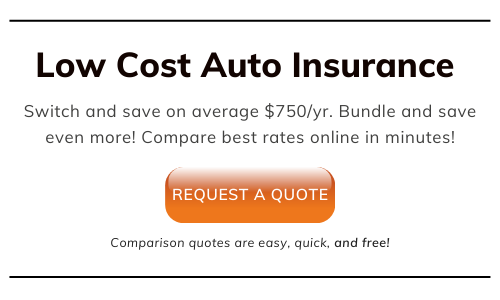Best Cheap Car Insurance in Connecticut
When you’re shopping for the cheapest car insurance in Connecticut, there are several factors to consider.
The most notable component of your insurance rate is your driving record.
Insurance companies also account for your credit rating, where you live, your gender, and the type of car you drive.
Of course, the amount of coverage you need is essential, too.
Most people think shopping for car insurance is a time-consuming exercise, but it doesn’t have to be.
Any time you undergo significant shifts in your lifestyle, such as move, get married, or buy a new vehicle, it’s helpful to shop for car insurance.
Because of the many variables that can influence policy cost, even small changes might impact your rate.
Cheapest Car Insurance in CT
Here are the top four companies offering cheap auto insurance in Connecticut:
Progressive

Founded in 1937, Progressive insures nearly twenty million drivers in the United States.
It provides basic coverages in Connecticut and add-ons which include roadside service and rental car reimbursement.
Liberty Mutual
Liberty Mutual began offering car insurance in 1914, making it one of the oldest car insurance companies in the United States.
It has a mobile app for easy policy changes, as well as thousands of agents across the company for person-to-person service.
USAA

USAA exclusively serves United States service members and families of service members, primarily through its online website.
As an association, USAA operates a bit differently from most insurance companies; it has members, not customers, and returns its profits to members in the form of bonus checks.
MetLife

MetLife is one of the largest global providers of insurance policies.
It offers a variety of car insurance plans in Connecticut and features add-ons such as enhanced rental car coverage and identity theft protection.
How Much Is Car Insurance in Connecticut?

When shopping for car insurance in CT, its good to know on average what other drivers are paying so you can have a good reference point as to what you are quoted:
- Average Cost of Car Insurance in CT: $1,048.56
- National Average Cost of Car Insurance: $889.01
As you can see, the cost of car insurance in Connecticut is higher than the national average.
Factors That Affect the Cost of Car Insurance in CT
The high rates for car insurance in Connecticut are based on several factors.
Traffic Conditions
In Connecticut, vehicles drive 1.4 million miles per mile of roadway.
There are 0.09 fatal accidents per every 1000 registered car in Connecticut.
This rate is lower than the countrywide average and lower than New York, but it’s higher than Rhode Island and Massachusetts.
Even though your driving history may be pristine, insurance companies must set rates based on statistics.
Because drivers in Connecticut are more likely to drive than walk or use public transportation, their insurance rates are higher.
Vehicle Theft Rates
Driving and storing your car in the city means you’re more likely to be in an accident, park on the street, or be a victim of car theft—and all of these play an important part in the actuarial math that determines your insurance rate.
While Connecticut’s vehicle theft rates (2.2 per 1000 registered vehicles) aren’t high when compared to the national average (2.74), they do rank higher than Massachusetts (1.7) and New York (1.49).
Even though your neighborhood may be in a low crime area, the comparably high rate of vehicle theft in Connecticut impacts your insurance rate.
Population Density
In Connecticut, more people live in cities than in rural areas, with statistics showing that 91.4 percent of the state’s residents dwell in urban areas.
With a population density of 741 persons per square mile (countrywide average is 90 persons per square mile), this small state might seem like it has a surprising number of people, but both Massachusetts and Rhode Island show higher densities at 861 and 1,009 respectively.
Insurance providers often coincide higher population densities with an increased likelihood of accidents.
Disposable Income
The NAIC report puts Connecticut’s per capita disposable income at more than $56,000; the countrywide average is just over $40,000.
Connecticut has more disposable income than New York ($47,446), Rhode Island ($42,585), and Massachusetts ($50,355).
This is important because insurers feel that a higher disposable income leads to a more significant proportion of high-end vehicles on the road which poses an increased chance of high-dollar claims.
Read more: Best Cheap Car Insurance In Massachusetts
What Is Mandatory for Car Insurance in Connecticut?
Most states require mandatory car insurance, including Connecticut.
Connecticut state law declares that the minimums for coverage are:
- $25,000 per person bodily injury liability
- $50,000 per accident bodily injury liability
- $25,000 per accident property damage liability
- $25,000 per person uninsured/underinsured motorist coverage
- $50,000 per accident uninsured/underinsured motorist coverage
While uninsured/underinsured motorist coverage may seem like an undue burden, it’s a smart investment when you review the rates of uninsured drivers.
In Connecticut, about 9 percent of all drivers are uninsured.
Additionally, when drivers carry only the state minimum for liability insurance, you may find that their insurance does not cover all the damages when you are involved in an accident.
Nationally, the average car crash victim absorbs about 25 percent of the costs associated with a car wreck.
Having uninsured/underinsured motorist coverage may therefore reduce your overall cost if you are involved in a wreck.
Connecticut requires that you always carry proof of insurance in your vehicle.
Your proof of insurance card must include the name of the insurance company, its NAIC number, at least one named insured matching one name on the registration, the policy number, effective dates, and vehicle specifications.
A temporary proof of insurance card may suffice if it includes the agent’s information, including printed name, signature, and code number.
It may be tempting to stick with the insurance limits mandated by the state.
However, if you own any assets, this may not be the best plan for you, as any accident may have significant financial consequences.
How to Reduce the Cost of Your Car Insurance in Connecticut
Maintain a Good Driving Record
On the average, insurance companies look at your driving record for the last five years, and some companies may go back even farther.
Since even minor infractions can have an impact on your insurance rates, if you’ve passed the five-year mark it may be worth mentioning it to your current company or doing a little comparison shopping on the side.
Bundle Coverages
Many insurance companies offer many types of insurance policies.
They may give you a discount if you carry more than one policy through their company such as homeowners and life insurance.
Raise Your Deductible
The higher your deductible, the less your premiums may cost.
It’s a good idea to make sure that you can meet your deductible; setting that money aside in a savings account may come in handy if you need to file a claim.
Reduce Optional Coverages
If you are no longer financing your vehicle, having full comprehensive and collision coverage may not be a sound investment.
This is especially true if the value of your car is less than ten times your policy.
You can also reduce your premiums by dropping add-ons including:
- Roadside assistance
- Rental car reimbursement
- Vanishing deductible
Ask for Discounts
Many companies offer discounts for paperless billing and paying in full at the beginning of your policy term.
When you’re shopping around, be sure to ask if any of these discounts can be applied to your quote.
Some providers are now offering a discount simply for allowing them to place tracking software in your car or on your phone, which monitors your driving habits.
Safe drivers then receive a discount.
When comparison shopping for the cheapest car insurance in Connecticut, you may want to have several pieces of information ready.
- Make, model, trim style, year and VIN for any vehicles on your policy
- Driver’s license, social security number, and date of birth for all drivers on your policy (If you have younger drivers, be sure to provide proof of above average grades.)
- Your typical daily commute distance and where you park your vehicles
What Can Increase the Cost of Your Car Insurance in Connecticut?
Unfortunately, there are many factors that can lead to higher insurance rates.
Although you might not be able to change every variable, take a glance at the list below to see if you can adjust your habits to reduce the negative impact these items might have on your policy rates.
Poor Driving Record
A poor driving record can affect the cost of your car insurance for years to come.
Speeding violations, at-fault accidents, and driving while under the influence of drugs or alcohol makes insurance companies believe you are a high-risk driver.
If you have these on your record, sign up for a defensive or instructional driving class and let your provider know you are interested in becoming a safer driver.
Many carriers have apps that can track your driving habits, and once your record is clear (usually after five years), you can start receiving discounts.
Youth or Inexperience
Drivers younger than 25 tend to pay more for insurance, especially young men.
Providers see inexperienced drivers as high-risk individuals, but most insurance companies look favorably upon completion of driver’s training classes and an excellent scholastic record.
On the other hand, elderly drivers may also find that their policies increase in cost.
Type of Vehicle
Luxury or high-performance sporty vehicles are often associated with higher-risk driving habits and tend to have elevated premiums.
Look for a lower-priced model with good safety features to lower your rates.
Car Theft
Your premiums go up if the make and model of your vehicle is a higher-than-average target for car theft.
Shopping For Car Insurance in CT
When comparison shopping, make sure that you start at least six to eight weeks before your current car insurance policy expires.
In Connecticut, failing to maintain your car insurance is a Class C Misdemeanor and is punishable by a fine of $500 or three months’ imprisonment—so you don’t want to ever be uninsured.
Additionally, if you let your insurance lapse for more than thirty days, you may miss out on any discounts your new insurance company may offer for having continuous insurance.
When shopping around, keep in mind that not every company offers the same rates and where you live affects your car insurance premiums.
Since insurers’ rates can drastically vary when comparing the same coverage, you may want to get at least three quotes before you make your final decision.
While comparison shopping, look at the financial stability of the company, whether or not it offers services you need such as online support or roadside assistance, and how comfortable you feel during the quote process.
As you’re shopping, check online to find ratings and reviews to help you finalize your decision.





